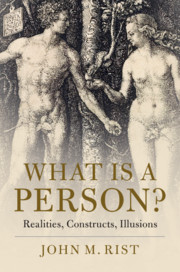Book contents
- What is a Person?
- What is a Person?
- Copyright page
- Contents
- Acknowledgments
- Introduction
- Part I Constructing the ‘Mainline Tradition’
- Part II No God, no Soul: What Person?
- Part III Toward Disabling the Person
- 15 Introducing the Five Ways
- 16 Assimilation and Homogenization
- 17 The Way of Prometheus
- 18 Whistling in the Humanitarian Wind
- 19 Virtual Morality: Propaganda as Social Glue
- 20 The Way to an Absolute Nihilism
- Part IV Persons Restored or Final Solution?
- Epilogue or Epitaph?
- Appendix The World of Rights Transformed Again
- Bibliography
- Index
17 - The Way of Prometheus
from Part III - Toward Disabling the Person
Published online by Cambridge University Press: 05 December 2019
- What is a Person?
- What is a Person?
- Copyright page
- Contents
- Acknowledgments
- Introduction
- Part I Constructing the ‘Mainline Tradition’
- Part II No God, no Soul: What Person?
- Part III Toward Disabling the Person
- 15 Introducing the Five Ways
- 16 Assimilation and Homogenization
- 17 The Way of Prometheus
- 18 Whistling in the Humanitarian Wind
- 19 Virtual Morality: Propaganda as Social Glue
- 20 The Way to an Absolute Nihilism
- Part IV Persons Restored or Final Solution?
- Epilogue or Epitaph?
- Appendix The World of Rights Transformed Again
- Bibliography
- Index
Summary
The myth of Prometheus can be read diversely: as a challenge to mankind to aspire, to challenge the gods, even in effect to claim to be a god; as an example of arrogance which should not be imitated and should be punished; or as all of the above. In the early nineteenth century the first of these would be promoted, by those who hated the Christian God, denied his existence and aspired to fill the gap with super-humans. Prometheans had not always been so apparently coherent in their claims about human capacities – whether moral or more normally artistic in some form; in the Renaissance Prometheus was usually invoked by those who still retained much of their Christian theism. In that earlier time, such views were in part a reaction against an extreme of self-denigration often preached in the Middle Ages – typified by Pope Innocent III’s De Contemptu Mundi – but already they could go beyond what had previously been recognized as orthodox Christianity, a fact recognized not least by Luther. Thus, Ficino’s ‘Know yourself, divine race in mortal clothing’1 comes perilously close to the Platonic view, always recognized as unchristian, that man is naturally immortal rather than made so by grace. A century later Giordano Bruno – a pre-enlightened voice anticipating the omission of historical Christianity from the Charter of the European Union – went much further; we should abandon the Christian centuries and return to a revised version of Graeco-Roman paganism.
- Type
- Chapter
- Information
- What is a Person?Realities, Constructs, Illusions, pp. 168 - 177Publisher: Cambridge University PressPrint publication year: 2019



